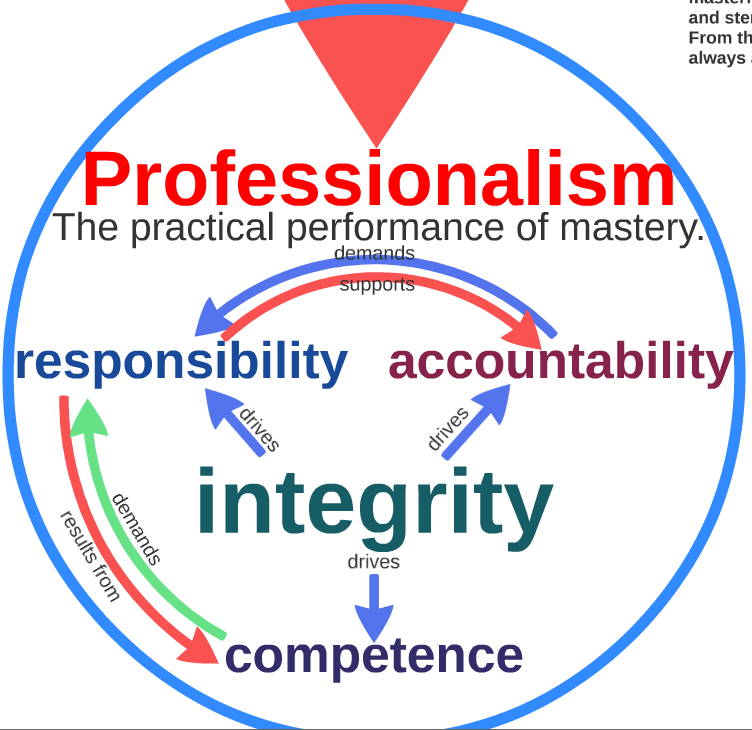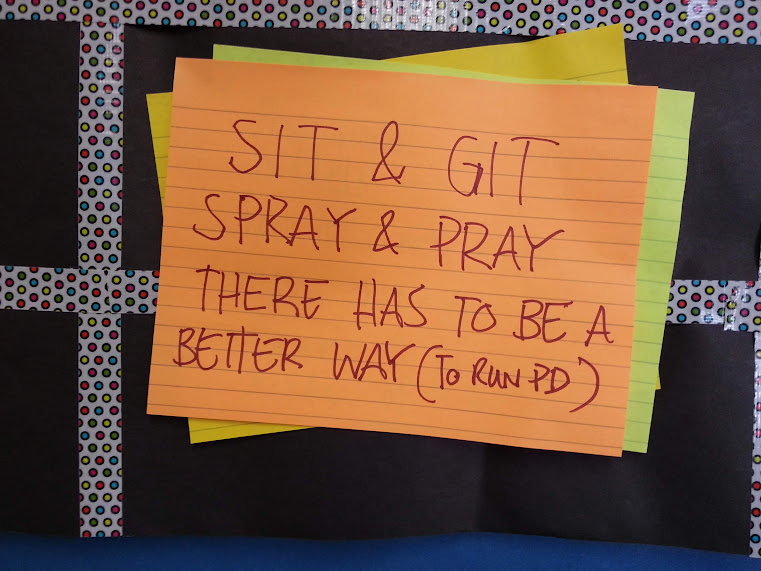 |
| A long, contemplative ride on the road less travelled to self directed PD. |
Discussions ranged from technology integration to how to most effectively assess student learning (along with dozens of other topics). What is magical about the edcamp experience is that teachers direct their own research and reflection. There is no top down directive or education consultant being paid to sell an idea. No one is paid to be there, no one is expected to be there, yet the room was full at 8:30 on a Saturday morning.
I've long thought that self-direction is the key element in professional development. I'd actually argue that PD isn't PD unless it is self directed. When you're sat in a room being indoctrinated by a talking head it isn't professional or development, it would be better described as mediocre training. Lecturing a group of people implies that they lack knowledge and need to be informed. It implies that they aren't professionals but unskilled employees who need direction.
I've got PD coming up this week. PD often involves a paid consultant earnestly exhorting you to differentiate your teaching practice, but they do it in a completely undifferentiated, university style lecture. If student centred differentiation is what you're selling, selling it in a lecture is either incredibly lazy or ignorant. In any case it suggests a lack of integrity.
 |
| I'm trying to work out what professionalism is in a Prezi mindmap |
In order to develop professional standards, professionals need only be left to their own devices, and perhaps given the time and space by management to focus on excellence. Edcamps encourage this kind of professional development, in fact they can't happen without it. PLCs also facilitate professional development by leaving the professional to develop their own means of improvement. I've been involved in learning fairs, unconferences and other teacher centred/teacher presented learning opportunities that have been invaluable as well as empowering.
The difference between a talented amateur and a professional is that the professional is committed to improvement and is thus willing to be accountable to their profession. The professional abides by the practices and standards of their profession and actively works to raise them. In this way a professional has a social responsibility to their profession that a dilettante doesn't, no matter how talented they might be. The professional isn't a one trick pony who acts solely on talent, but a talented individual who begins with natural inclination and then works to develop it into a much wider skill-set that acknowledges the full complexity of their discipline. Some secondary teachers fall into thinking that they are a subject expert before they are a teacher. Being a subject expert isn't what they are being paid (professionally) to do, it's teaching. Teaching is the professional practice we (especially at the secondary level) sometimes forget.
Accountability is where professional development with teachers seems to fall apart. Management fears that if left to their own devices some teachers will not actively work to improve their professional standards. In some cases this may in fact be true. It would be a fairly simple task to itemize the professional development opportunities teachers pursue and account for who is attempting to improve their professional practice and who isn't, but we don't do that in teaching.
| You can usually tell which teachers take time to attend to their professional practice... |
Instead of only looking at years in the classroom it would be nice if we accepted that some teachers take on a more professional approach to teaching. It would be easy enough to quantify that approach. How many subject areas have they become qualified in? Do they demonstrate continuous improvement? How many self directed PD opportunities do they take? Do they take on positions of extra responsibility? What do they do to support their subject area? The profession of teaching in general? Until we accept that not all teachers are created equal, we ignore both integrity and responsibility and are unable to accurately apply accountability to our profession.
Is teaching a job that requires management to take attendance and force simplistic PD down people's throats? Evidently, in which case it isn't really a professional activity. Is teaching a profession that demands self directed development through stringent accountability? If it was it would be driven by teachers' professionalism rather than by attendance rolls and tell-me-don't-show-me lectures.
At the core of professional practice is the self directed development of your expertise. I've got a PD day (the only one this semester) next Friday. It will be interesting to see how this board run day will compare to the dynamic and responsive urgency of the edcamp I just attended. I imagine I'll see differences in the first few moments when teachers I never see doing self-directed PD are whining about why they have to be there (because they're being paid to do it). Then they will take attendance and the differences will only get more obvious.
Professionalism Resources:
http://www.mindtools.com/pages/article/professionalism.htm
http://www.med.uottawa.ca/students/md/professionalism/eng/about.html
 |
| #edcampham discussion suggestion |
http://education.und.edu/field-placement/files/docs/professionalism.pdf
http://www.slideshare.net/jazzmichelepasaribu/professionalism-in-education
http://www.sciencedirect.com/science/article/pii/S1877042810025498

